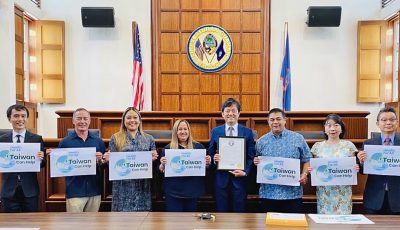Health advisory issued on Zika virus
WHO declares ‘public health emergency of international concern’
A health advisory was issued by the Commonwealth Healthcare Corp. last week following the declaration of the World Health Organization for a “public health emergency of international concern” due to the effects of the Zika virus in Brazil.
WHO director-general Dr. Margaret Chan declared the PHEIC after the first meeting of the Emergency Committee held last week via teleconference.
PHEIC is defined as an extraordinary event which is determined to constitute a public health risk to other states through the international spread of disease” and “potentially require a coordinated international response.”
This implies that the situation is serious, unusual or unexpected.
“The CHCC Public Health and Hospital Emergency Preparedness Program, in partnership and collaboration with Center of Disease Control and Prevention (CDC), And the World Health Organization (WHO) International Health Regulation Emergency Committee, have advised, that the recent cluster of microcephaly cases and other neurological disorders reported in Brazil, following a similar cluster in French Polynesia in 2014, and in Yap Federated States of Micronesia in 2007, constitutes a Public Health Emergency of International Concern (PHEIC),” the advisory said.
One of the main concerns in being infected by the virus is its effect on pregnant women and their child.
Women in Brazil who have contracted the virus during pregnancy were linked to having children who has microcephaly or smaller head circumference, which usually results from abnormal brain development.
A U.S. territory, Puerto Rico, has declared public health emergency after cases of the virus increased to 22.
Tonga, a kingdom in the South Pacific, has declared Zika epidemic after five reported cases.
While no cases are yet reported in the CNMI, CHCC’s health advisory encouraged residents to clear possible mosquito breeding grounds and recommended precautionary measures for pregnant women.
“The public is highly encouraged to rid of any water receptacle outside their houses that make a breeding ground for mosquitoes that may carry viruses or diseases, such as Dengue, Chikungunya, or Zika and other mosquito borne diseases and viruses,” the advisory said.
“Women of childbearing age and particularly pregnant women should adhere to all Public Health necessary information and materials to reduce the risk of exposure. Pregnant women exposed to Zika virus should report to their medical provider and seek medical advice,” it added.
Recommendations were made by the committee with regards to addressing the PHEIC and their possible association with Zika virus, which were endorsed by the director-general.
The committee highlighted the importance of aggressive measures to reduce infection with Zika virus, particularly among pregnant women and women of childbearing age.
As additional precautionary measures, the committee also called for the enhanced surveillance on Zika virus transmission as well as intensified research and development efforts for Zika virus vaccines, therapeutics, and diagnostics among others.
While there were no recommended restrictions on travel or trade with countries, areas, and/or territories with Zika virus transmission, advice on potential risks and appropriate measures to reduce the possibility of exposure to mosquito bites should be given.
Standard WHO recommendations regarding disinfection of aircraft and airports should also be implemented.



























